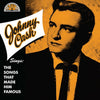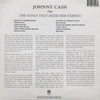



Johnny Cash - Sings The Songs That Made Him Famous (150g)
COMPILATION
Johnny Cash — Vocals, guitar [click here to see more vinyl featuring Johnny Cash]
Luther Perkins - Lead Guitar
Marshall Grant - Bass
Written by Johnny Cash (A2-4, A6, B2, B5-6), J. Clement (A1, A5), Justis (B1), Rich (B1), Johnson (B3), Adkins (B3), Williams (B4), Dougles (B5), McAlpine (B5)
1 LP, standard sleeve
Original analog Master tape : YES
Heavy Press : 150g
Record color : black
Speed : 33 RPM
Size : 12'’
Stereo
Studio
Record Press : Premium Quality Vinyl in the Czech Republic
Label : ORG Music
Original Label : Sun
Recorded April 2, 1956 – July 10, 1958
Produced by Sam Phillips, Jack Clement
Originally released in 1958
Reissued in 2015
Tracks:
Side A :
- Ballad of A Teenage Queen
- There You Go
- I Walk the Line
- Don't Make Me Go
- Guess Things Happen That Way
- Train of Love
Side B:
- The Ways of A Woman in Love
- Next In Line
- You're the Nearest Thing to Heaven
- I Can't Help It
- Home of The Blues
- Big River
Reviews:
“These early Cash classics provided him with hits and many other artists with some great material. And the sparse sound of The Tennessee Two holds up well.” AllMusic Review by Jim Worbois
From the liner notes: “Even as a little boy, Johnny Cash has a feeling he was going to be famous one day. It wasn’t the kind of premonition he could go about telling people. They’d have thought dreams of fame and riches pretty far removed from the Cash’s barely-productive 40-acre cotton farm in Arkansas. Especially since Johnny had no idea how he was going to make his mark.
Johnny left the farm to go into the Air Force — and in his travels he acquired first, a wife — and secondly, a guitar. Assigned to Germany and forced to leave his wife behind, Johnny found a faithful companion in his guitar. The boys in his barracks seem to like his “pickin’ and singin'” and gradually the plan for a career began to take shape. He would be a singer — a country singer.
When he got back from service, Johnny was not so modest about his plans for the future. He let his Memphis friends know he was going to be a singer — a good singer, a famous singer — a singer who would revolutionize country music. No matter how long it took — he was determined!
As it happened, Lady Luck inclined her face toward Johnny almost immediately. His releases on the Sun label were instantly acclaimed, and in 1956, one year after Johnny Cash launched his recording career, he was named the most promising country and western artist of the year in four separate polls.
After the success of “I Walk the Line” as a simultaneous C & W and popular hit, it was indicated the course Johnny’s career should take. Though always identifying himself as a singer for the country fans — a favorite entertainer on the Grand Ole Opry — Johnny Cash with “Ballad of a Teen-Age Queen” came to be a top selling artist in the pop recording field.
Almost reluctantly, Johnny evolved a pop-county style in arrangement and instrumentation, evident in such hits as “Guess Things Happen That Way” and “The Ways of a Woman in Love” to supply the demand for Cash records by fans of both types of music. It is ironic that Johnny Cash caused more of a revolution in pop music than in country music, as was his aim, by being one of the first C & W artists exposed on national “general entertainment” TV shows; and the first C & W artist to capture the LP market with one great release (Sun 1220).
Johnny Cash — in his voice, looks and demeanor — carries a certain aura of “specialness.” He is a very dramatic figure — tall, muscular, with blue-black hair. He looks the part of a folk singer — a 20th century wandering minstrel. And his fatalistic style, both in composing and singing, has a quality of monotone, but of “emotional monotone” that defies analysis, but which is genuinely powerful.
Johnny Cash is one of those persons endowed with an exceptional talent which has to express itself. And being expressed, his talent has been uniquely recognized and applauded by many loyal fans, who will enjoy this reminiscent album of the songs which to date are landmarks in the career of the one and only Johnny Cash.”
“By 1958, Johnny Cash had already been in the spot light for three years with hit singles and his debut album coming in 1957. Although singles from his second album were sprouting in 1956, his second effort, “Johnny Cash Sings the Songs that Made Him Famous,” arrived in November of 1958. This album seems more love-driven, rather than his prison-themed first album.
Teen angst was the message in the mid to late 1950s, which shows in Cash’s first song of the album, “Ballad of a Teenage Queen.” Cash’s storytelling depicts a “small town girl,” who loves the “boy next door”; she left him behind for Hollywood, but she could never find happiness without him. She ended up selling her fame to go back to him. This beautiful tale reached number one in the Country Billboard charts and number 14 on the Billboard Hot 100 in 1958. Released in 1956, the next track, “There You Go,” reached number one in the Country charts. “Don’t Make Me Go,” is a love tale which peaked at number nine in the Billboard Country charts.
A nice little number, “I Guess Things Happen That Way,” this track was a Country number one hit, while it simultaneously peaked at number 11 on the Pop charts. This track can speak to anybody who received recent heartbreak, but Cash reassures us that “things just happen that way.” “Train of Love,” went on to number seven on the Country charts, while its upbeat rhythm seeps into American hearts. Cash continues to rule the charts as “The Ways of a Woman In Love.” In this love number, Cash and his background singers sing about Cash’s regret of losing his woman. This track reached number two on the Country charts and 22 on the Pop charts.
Next in line is “Next in line,” which reached number nine on the Country charts and 99 on the Pop charts. “Big River” was the last track of the album, and it went to under four on the Country charts and 14 on the Pop charts.
Reaching number five on the Country Charts and number 24 on the Pop charts, “You’re the Nearest Thing to Heaven,” was actually the last single from the album to chart, This track is a sweet song to be heard by anyone and any woman should hear from her man. Arguably, the most truthful track, “Home of the Blues,” is about Cash’s unhappy childhood. His unhappy childhood was good enough to make it to number three on the Country and number 88 on the Pop charts.
All in all, Cash sprouted nine songs from this 12-track album that charted. This album is arguably Cash’s biggest crossover success as most of the songs reached both the Country and Pop charts. Cash still lingers in everybody’s heart since his appearance in 1955. This album can be a great album for Johnny Cash newbies and for Johnny Cash lovers. Buy it and enjoy it. Music like this doesn’t get as honest, raw, and catchy that much nowadays.” Sun Records
Ratings :
AllMusic : 4 / 5 , Discogs : 4,31 / 5



